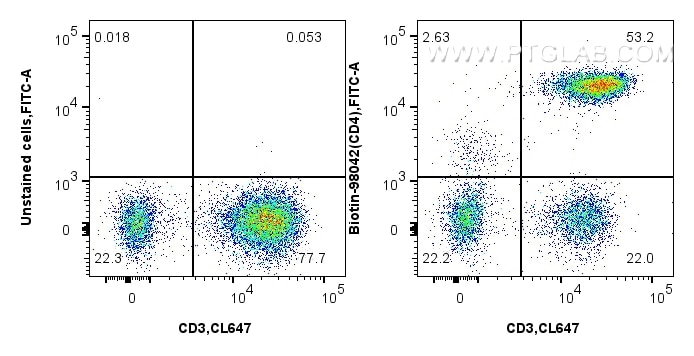Tested Applications
| Positive FC detected in | human PBMCs |
Recommended dilution
| Application | Dilution |
|---|---|
| Flow Cytometry (FC) | FC : 0.25 ug per 10^6 cells in a 100 µl suspension |
| This reagent has been tested for flow cytometric analysis. It is recommended that this reagent should be titrated in each testing system to obtain optimal results. | |
| Sample-dependent, Check data in validation data gallery. | |
Product Information
Biotin-98042 targets CD4 in FC, ELISA applications and shows reactivity with human, monkey, non-human primates samples.
| Tested Reactivity | human, monkey, non-human primates |
| Host / Isotype | Rabbit / IgG |
| Class | Recombinant |
| Type | Antibody |
| Immunogen |
CatNo: Eg0333 Product name: Recombinant Human CD4 protein (His Tag) Source: mammalian cells-derived, pHZ-KIsec-C-6*HIS Tag: C-6*HIS Domain: 26-396 aa of BC025782 Sequence: KKVVLGKKGDTVELTCTASQKKSIQFHWKNSNQIKILGNQGSFLTKGPSKLNDRADSRRSLWDQGNFPLIIKNLKIEDSDTYICEVEDQKEEVQLLVFGLTANSDTHLLQGQSLTLTLESPPGSSPSVQCRSPRGKNIQGGKTLSVSQLELQDSGTWTCTVLQNQKKVEFKIDIVVLAFQKASSIVYKKEGEQVEFSFPLAFTVEKLTGSGELWWQAERASSSKSWITFDLKNKEVSVKRVTQDPKLQMGKKLPLHLTLPQALPQYAGSGNLTLALEAKTGKLHQEVNLVVMRATQLQKNLTCEVWGPTSPKLMLSLKLENKEAKVSKREKAVWVLNPEAGMWQCLLSDSGQVLLESNIKVLPTWSTPVQP Predict reactive species |
| Full Name | CD4 molecule |
| Calculated Molecular Weight | 55 kDa |
| GenBank Accession Number | BC025782 |
| Gene Symbol | CD4 |
| Gene ID (NCBI) | 920 |
| ENSEMBL Gene ID | ENSG00000010610 |
| Conjugate | Biotin |
| Form | Liquid |
| Purification Method | Protein A purification |
| UNIPROT ID | P01730 |
| Storage Buffer | PBS with 0.09% sodium azide, pH 7.3. |
| Storage Conditions | Store at 2-8°C. Avoid exposure to light. Stable for one year after shipment. |
Background Information
CD4 is a 55-kDa transmembrane glycoprotein expressed on T helper cells, the majority of thymocytes, monocytes, macrophages, and dendritic cells (PMID: 9304802; 12213222). CD4 is an accessory protein for MHC class-II antigen/T-cell receptor interaction. It plays an important role in T helper cell development and activation (PMID: 9539765; 3112582). CD4 serves as a receptor for the human immunodeficiency virus (HIV) (PMID: 9304802).
Protocols
| Product Specific Protocols | |
|---|---|
| FC protocol for Biotin CD4 antibody Biotin-98042 | Download protocol |
| Standard Protocols | |
|---|---|
| Click here to view our Standard Protocols |




